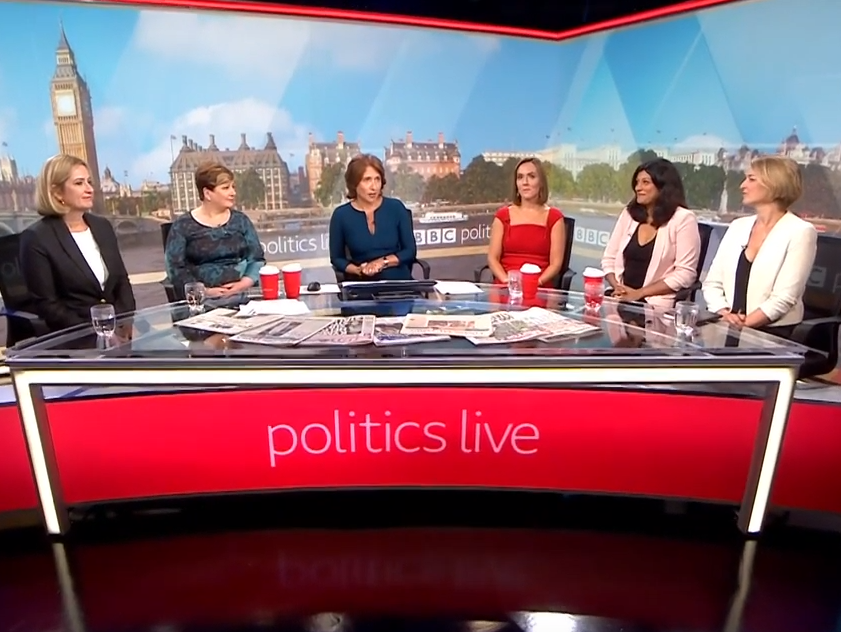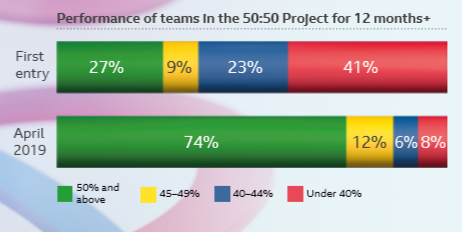
Three-quarters of BBC news, current affairs and topical programming teams that have been monitoring their gender diversity for the past year have reached a 50:50 on-air gender split.
More than 500 teams within the BBC have now signed up for the 50:50 challenge, targeting an equal balance in male and female voices, up from 84 when it launched in April last year.
Staff at the news, current affairs and topical programmes that signed up to the project self-monitor data and share it with the rest of the BBC in the spirit of “positive competition and collaboration”.
In news, those who are central to stories – for example the Prime Minister – are not counted, but reporters, analysts, academics and case studies are.
Of the programmes that have been monitoring their gender balance for 12 months or more, 74 per cent now have at least equal representation of men and women on-screen.
Twelve months ago, just 27 per cent of those programmes were on a 50:50 gender split.

The performances of BBC news, current affairs and topical programming teams who have been in the BBC’s 50:50 project since at least April 2018. Picture: BBC
News programmes which hit a 50:50 on-air gender split in April include The Andrew Marr Programme, Politics Live, The Media Show, This Week, Westminster Hour, Reporting Scotland, Newsround, and Outside Source, which pioneered the technique of self-monitoring gender diversity in 2017.
BBC News online’s UK and world sections have also reached 50 per cent.
BBC News at Six and Ten are both on 49 per cent, an increase of 7 per cent and 10 per cent respectively.
The programmes’ editor, Paul Royall, said: “We’re really keen to progress and the team have been making concerted efforts to ensure we continue to hear from a range of different voices on our output.”
Radio 4’s Today and PM programmes both reached 48 per cent female representation in April, up from 38 and 33 per cent respectively.
Despite now having an all-female presenting line-up with Emily Maitlis, Kirsty Wark and Emma Barnett, Newsnight reported a score of 44 per cent in April 2019, up from 37 per cent.
The BBC News Channel has risen from 38 per cent to 44 per cent women contributors.
Certain topic areas, such as politics and business, have proved more challenging to improve as they have historically been covered by men, a BBC report published today said.
Staff are therefore working to increase the BBC’s pool of regular contributors, sharing new contacts through the 50:50 hub so they can appear on various programmes.
Miranda Holt, assistant editor of the BBC’s live political programmes, said: “Politics can be a male dominated environment but our team’s success in the 50:50 Project has given us the satisfaction of seeing new voices – politicians, journalists and commentators – on all our live political programmes.”
Politics Live, which increased its representation of women from 44 per cent in December 2017 to 53 per cent last month, has had all-female panels while This Week tries to ensure it features a regular female Labour presenter alongside Conservative Michael Portillo.
“Overall, we’ve had a positive response from political parties who accept that this is how BBC News operates and have been more imaginative in which spokespeople they put up for interview,” Holt added.
It has also been harder for programmes which are “heavily reliant” on BBC reporters and correspondents for their content, highlighting the importance of diversity within the BBC itself.
BBC director of news Fran Unsworth said: “We want to ensure the BBC reflects its audiences better – and that’s at the heart of the 50:50 Project.
“It’s extremely encouraging to see the progression made by so many teams to ensure we have more female voices represented across our news and current affairs output and it can only add to the quality of the programming we offer our audiences.”
Due to the success of the project around 20 external partners, including the Financial Times and STV in the UK, are now signed up to replicate the 50:50 Project.
BBC director-general Tony Hall said the “remarkable change” at the BBC was already visible across its programming.
“I want the BBC to lead the way on equality and fairness, and this project demonstrates what can be achieved,” he said.
“Better representation is something the whole media industry needs to address so I’m really pleased others are now following us and adopting this project for their own organisation.”
Picture: BBC
Email pged@pressgazette.co.uk to point out mistakes, provide story tips or send in a letter for publication on our "Letters Page" blog
